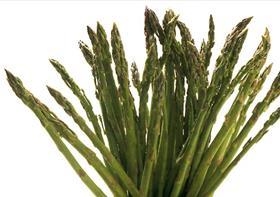
Unseasonably cold and wet weather in early 2013 has pushed the asparagus season back several weeks, costing growers dear and reducing availability in the shops.
The main season usually begins on 1 May, but according to grower John Chinn of Cobrey Farms, only one open field variety has started yielding now in mid-May and most of the crop is still not ready.
“It is raining, it is cold, it is just like winter,” he says. “I don’t like to be negative, but it is proving to be a disappointing season. If everything is late by a month, that is a month’s lost income.”
Dan Grover, business unit director of Barfoots of Botley, is similarly despondent. “It is one of the latest UK asparagus seasons on record,” he says. “Only last week did it start cropping outdoors. Volumes are down significantly and this week we are only harvesting 25 per cent of our normal volumes for this time of year. You’ve only got to look out of the window to see the reason. It has been incredibly cold both day and night. The season is normally eight weeks but this year it will only last five for us. Unless the weather improves sales will be down between 40 per cent and 50 per cent.”
Ian Mitchell, director of Finlays Fresh Produce, adds that production is around three weeks behind due to the weather. “The sheer volume of rain has damaged the crowns and the cold soil temperature means the spears have been slower to come up, so volumes are down considerably.”
However, Finlays has been able to harvest some asparagus for the past five to six weeks due to planting more under cloche. Mitchell says Finlays plans to keep increasing the volumes of asparagus grown under cover in coming years.
“We grow 50 per cent under cover and we have increased the area by 10 per cent to 15 per cent this year due to the variability of the weather,” he says. “It is more expensive because you have to remove the covers to harvest the crop. We will increase covered production by a similar amount next year.”
Mitchell remains optimistic for a “bumper crop in late June,” should the weather perk up and he is also cheered by increasing awareness and popularity of the vegetable among the public. “Asparagus is certainly much sought after and there is always high demand. The challenge for the industry is to produce enough of this iconic British product.”
The industry has worked hard to extend the asparagus season from the traditional eight weeks in early summer. Some producers such as Finlays and Cobrey Farms have succeeded with early varieties grown under cover and so-called reverse-season crops, which require precise feeding and watering techniques and are harvested in the autumn.
Mitchell says Finlays wants to extend the season yet further. “We now produce from March to July, then we have a break and produce in September and October,” he says. “Our intention is to produce Valentine’s Day asparagus. I think we’re close to having something next year. As always though, the weather could ruin it.” —



